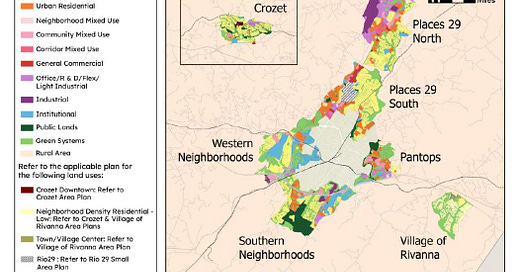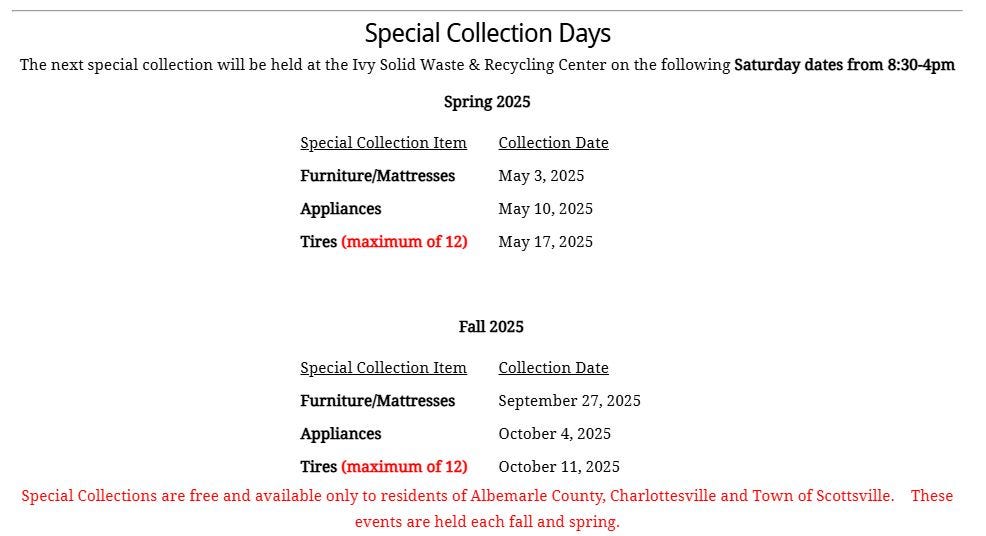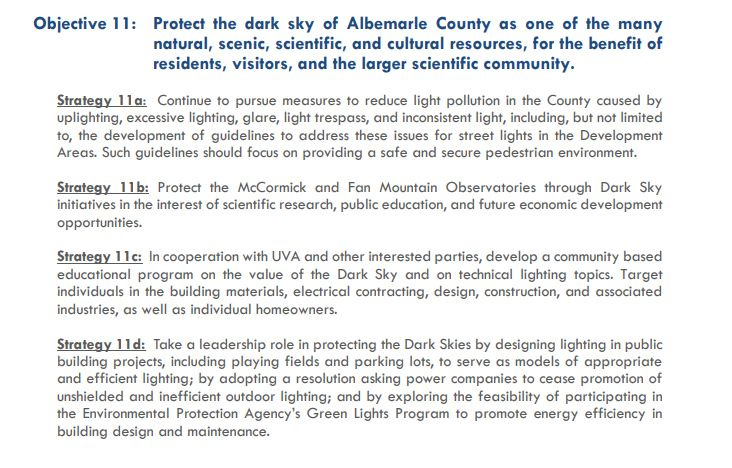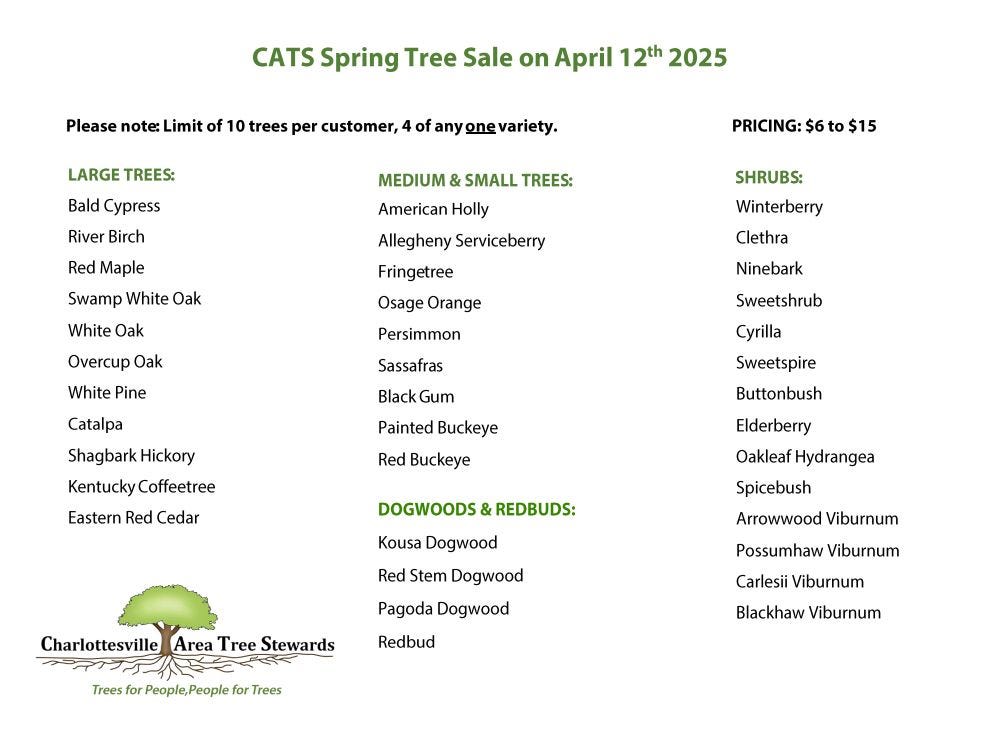April 3, 2025: Albemarle Supervisors continue AC44 process with discussion of rural vs. growth area development
Plus: Six other stories that stem from the April 2 meeting
What exactly constitutes an edition of Charlottesville Community Engagement? This is a very good question and the answer is that each one is produced on a slightly different kind of day depending on some sort of cosmological equation that may or may not be worth doing. I’m Sean Tubbs and I can say that this edition for April 3, 2025 and perhaps the one after is deliberately intended to document one particular meeting of the Albemarle County Board of Supervisors? Why? Even I can’t see my algorithm.
In today’s installment:
There are three budget town halls left in Albemarle County before public hearings begin later this month
A nonprofit that raises funds for the Shenandoah National Park is sharing information about how federal cuts are affecting operations
There’s a relatively new art gallery in Scottsville
If you’re planning your spring cleaning, solid waste amnesty days are approaching
Albemarle Supervisors recognize Dark Sky Week coming up April 21 through April 28
April is Financial Literacy Month
Albemarle Supervisors continue to discuss growth as part of the long and road that is the country’s Comprehensive Plan review
First-shout: JMRL Book Sale
One of the most important weeks of the year is now upon us!
The Friends of the Library Fall Book Sale will be held at Albemarle Square Shopping Center on Saturday, April 5 through Sunday, April 13, from 10 am - 7 pm each day. In addition to books, the sale also offers music, movies, games, puzzles and ephemera, and is restocked each day of the sale.
A pre-sale will be held Friday, April 4, from 5 - 7 pm, for members of the Friends of the Library. Memberships can be purchased or renewed at the door, or online at jmrlfriends.org prior to the day of the pre-sale. Scanners will not be allowed at the pre-sale or on Saturday from 10 am – 1 pm.
Proceeds of the Friends of the Library book sale benefit JMRL, the regional public library system serving Charlottesville, Albemarle, Greene, Louisa and Nelson.
Visit jmrlfriends.org for more information.
Three more budget town halls scheduled in Albemarle County
Albemarle County will not hold a public hearing on County Executive Jeffrey Richardson’s proposed budget for FY2026 until April 23. A week later there will be a public hearing on April 30 on the county’s tax rates.
Already there have been four work sessions and four budget town halls. Those town halls all feature the same basic presentation and allow people to ask questions about how Albemarle government works and what’s in the budget.
Supervisor Michael Pruitt said the town halls in his district have already been held.
“We still have about three more on the docket but I have finished my third and final so thank you for everyone who came out to those,” Pruitt said.
Those will be held:
“We are honored to be the very last town hall but we’ll be wrapping all of them up,” said Supervisor Diantha McKeel. “Come on, come all! It’s your last opportunity.”
There is a recording of the one that was held at Monticello High School. At publication time there have been 55 views. Sammy Hagar is not pleased and we must get that number higher because he cannot.
There is also a budget work session scheduled for April 7, 2025. For all of my stories about Albemarle’s budget process, visit Information Charlottesville.
Shenandoah National Park Trust offers information on park activities
The attempts by President Donald Trump to act unilaterally seem to be shaping every aspect of American life. Nearly all aspects of the federal government are changing due to actions that are still subject to judicial and legislative checks and balances due to the U.S. Constitution.
That includes the U.S. Department of the Interior which includes the National Park Service which runs 22 sites in Virginia including Shenandoah National Park. The park’s website is run by the federal government but operations in the park itself depend on assistance from the Shenandoah National Park Trust. That’s the official nonprofit partner organization whose Board does not work for the federal government.
“Since its founding in 2004, the Trust has raised more than $7 million in support of far-ranging endeavors: natural and cultural resource protection, overlook renovation, land acquisition and conservation, and youth education and engagement,” reads the trust’s website.
The SNP Trust now offers information about how the park has been affected by cuts made by the White House. A total of fifteen probationary employees were let go, according to the page. These positions included maintenance, sanitation, and other operational roles such as collecting fees from visitors.
The last update is from March 26 and reminds readers that Congress passed a Continuing Resolution to keep the federal government operating which seeks to reduce nondefense spending by $15 billion in FY2025.
“At this time, we don’t know how these cuts will impact Shenandoah National Park,” reads a portion of the SNP trust website on the effects of the federal cuts.
A February 27 memo from the Office of Personnel Management called for reductions in staff and leadership at the National Park Service have to submit a list of filled and unfilled positions by April 25.
Adding confusion to the matter is that the Trump administration was ordered by federal Judge William Alsup on March 13 to reinstate probationary employees who had been fired en masse. A lower court judge in Maryland agreed and issued orders to reinstate employees at 18 federal agencies.
To stay up to date, visit the website yourself.
Scottsville’s Center for the Arts and Natural Environment offering new gallery space
Since 2004, Scottsville’s Center for the Arts and Natural Environment has existed to encourage members of the community to see connections between human imagination and the ecological landscape. The nonprofit organization has recently opened a new space to display works.
“This is the former Riverbend Boutique,” said Supervisor Michael Pruitt at the April 2, 2025 meeting of the Albemarle Board of Supervisors. “They have their debut show open currently that will be running through the rest of the month.”
That show is an Arts and Nature exhibit running through April 27. The gallery is open Thursday through Sunday and by appointment. There is an open call for submissions and you can see details on their website.
Pruitt said the gallery might be worth a trip to Scottsville, Albemarle County’s only town.
“And it is some surprisingly affordable art for those who are interested in filling out their home,” Pruitt said.
SCAN is also planning an Earth Day Celebration on April 19 from 10 a.m. to 2 p.m.
RSWA enacts waitlist for e-waste amnesty day, other activities scheduled
If you are doing spring cleaning and need a place to take certain kinds of items, this is a good time to consult the website of the Rivanna Solid Waste Authority. There are a series of upcoming dates where residents of Albemarle County and Charlottesville can drop off items at the Ivy Creek Solid Waste and Recycling Center for free.
However, registration is full for the e-waste day scheduled for April 19 but the RWSA is taking names for a waitlist.
Here’s a schedule for the remaining free collection days:
April 24, 2025 – Commercial Hazardous Waste
April 25 & 26, 2025 – Household Hazardous Waste
May 3, 2025 – Furniture & Mattresses
May 10, 2025 – Appliance
May 17, 2025 – Tires
For more information, visit the RSWA website.
Albemarle Supervisors mark Dark Sky Week
The start of local government meetings offer a chance for elected officials to celebrate and recognize all sorts of items related to our society. On April 2, 2025, the Albemarle Board of Supervisors used their first proclamation to lament an aspect of civilization.
“The aesthetic beauty and wonder of a natural night sky is a shared heritage of all humankind, the experience of standing beneath a starry night sky inspires feelings of wonder and awe,” said Supervisor Ann Mallek. “Many people in Albemarle county live under a dome of light pollution, excessive artificial lighting at night that disrupts natural darkness and may never experience the visual wonder or ecological and health benefits of living under a dark sky.”
The Historic, Cultural, and Scenic Resources chapter of the 2015 Albemarle County Comprehensive Plan has an objective to “protect the dark sky.” This mentions the University of Virginia’s Fan Mountain Observatory. Mallek said that southern Albemarle is close to James River State Park, one of four parks in Virginia designated as an International Dark Sky Park.
To confirm their commitment to fighting light pollution, Supervisors recognized Dark Sky Week which is coming up April 21 through April 28. (read the proclamation)
“Peak spring bird migration falls during Dark Sky Week and 80 percent of migrating birds fly at night and need starlight to navigate,” Mallek said.
The proclamation was accepted by Christine Putnam, the chair of the county’s Natural Heritage Committee and a member of the Dark Skies Piedmont Group.
“All things on this planet evolved with a predictable cycle of day and night,” Putnam said. “The rhythm of light and darkness is essential to our health and well being. With the advancement of inexpensive and efficient LED outdoor lighting, the darkness of the night is disappearing at an alarming rate.”
Putnam said one solution is better planning that takes light pollution into consideration. She asked the county to hire a consultant to recommend an outdoor lighting ordinance and specifically pointed to the Town of Vienna in Fairfax County for their work. That locality recently hired the firm Clanton & Associates to review their rules.
Supervisor Bea LaPisto-Kirtley said light pollution threatens the population of one species that can help reduce the population of another.
“The bat population, very, very important for the bat population and they eat up all those pesky mosquitoes,” said LaPisto-Kirtley. “So this is why it's so important to have dark skies, because the lighting does interfere with bats at night.”
The topic also came up briefly later in the meeting during a discussion of the Comprehensive Plan update. At least one Supervisor expressed a concern that requiring review of development plans for Dark Sky provisions will add to the cost of housing.
Second-shout out: Charlottesville Area Tree Stewards
The next shout-out is one I’m very interested in. There is now a big school behind my house and I’d like to plant some trees to screen my property. I really have no idea how to do such a thing, but you can bet where I’ll be the morning of April 12, 2025!
That’s when the Charlottesville Area Tree Stewards will be holding their annual tree sale at the Virginia Department of Forestry at 900 Natural Resources Drive in Charlottesville. The group has their own tree nursery, entirely run by volunteers. They plant saplings obtained from multiple sources and nurture them until they are large enough to be planted out. They concentrate on native trees, some of which are hard to find from commercial sources.
They don’t have a list yet, but stay tuned to this space for details. But, this is a good day to get that on your calendar! Click here for more details!
Albemarle Supervisors honor Mahogany and Friends as part of Financial Literacy Month
How well do you know how your money works? What might you be able to learn to use your resources more efficiently? That’s part of the point behind Financial Literacy Month as defined in a proclamation adopted by the Albemarle Board of Supervisors on April 2.
“Financial literacy is essential to the economic health and well-being of individuals, families, and communities, empowering people to make informed decisions about budgeting, saving, investing, and managing debt,” said Supervisor Diantha McKeel as she read from a resolution.
An organization called the National Endowment for Financial Education helped create the month in the early 2000’s as Youth Financial Literacy Day. Albemarle’s proclamation was received by Janasha Bradford of the group Mahogany and Friends.
“Mahogany and Friends started as a passion project, a way to make financial literacy fun, creative and culturally relatable for our youth,” Bradford said. “We believe that if you teach kids about money early, you're not just teaching them how to save or spend. You're teaching them how to build confidence, make smart decisions and shape the life they want to live.”
Bradford said one offering the organization offers during the month is a budget workshop that will be attended by over 300 young people who attend the Boys and Girls Club in Albemarle County and Charlottesville. In the summer they offer a one-month summer money workshop.
Supervisor Ned Gallaway said he appreciates that Mahogany and Friends uses the term “financially capable.”
“There's a certain level of confidence, both psychologically and emotionally, that comes with that, that if you find yourself in the reverse situation, especially when one bad financial decision could live with you for 5, 10, 15 years, if not longer,” Gallaway said.
Read Supervisors’ full proclamation for Financial Literacy Month here.
Albemarle staff present Albemarle Supervisors with new information on AC44
Almost three months have passed since this newsletter has featured a single story about the ongoing update of Albemarle County’s Comprehensive Plan. The review officially kicked off in November of 2021, nearly six years after Supervisors last made the plan an official county document. Virginia law requires a review every five years.
Many communities hire a consultant to help oversee creation of a new plan. The City of Charlottesville hired the firm Rhodeside & Harwell in late 2019 after the city Planning Commission’s review stalled. Nelson County hired the Berkley Group to complete a thorough review in that community.
The task in Albemarle is up to staff in the Department of Community Development. A decision was made in the spring of 2024 to take a pause to slightly reformat what is known as the AC44 process. Since last fall, the Planning Commission and the Board of Supervisors have been going chapter by chapter and not all of the sections have been made available to the public.
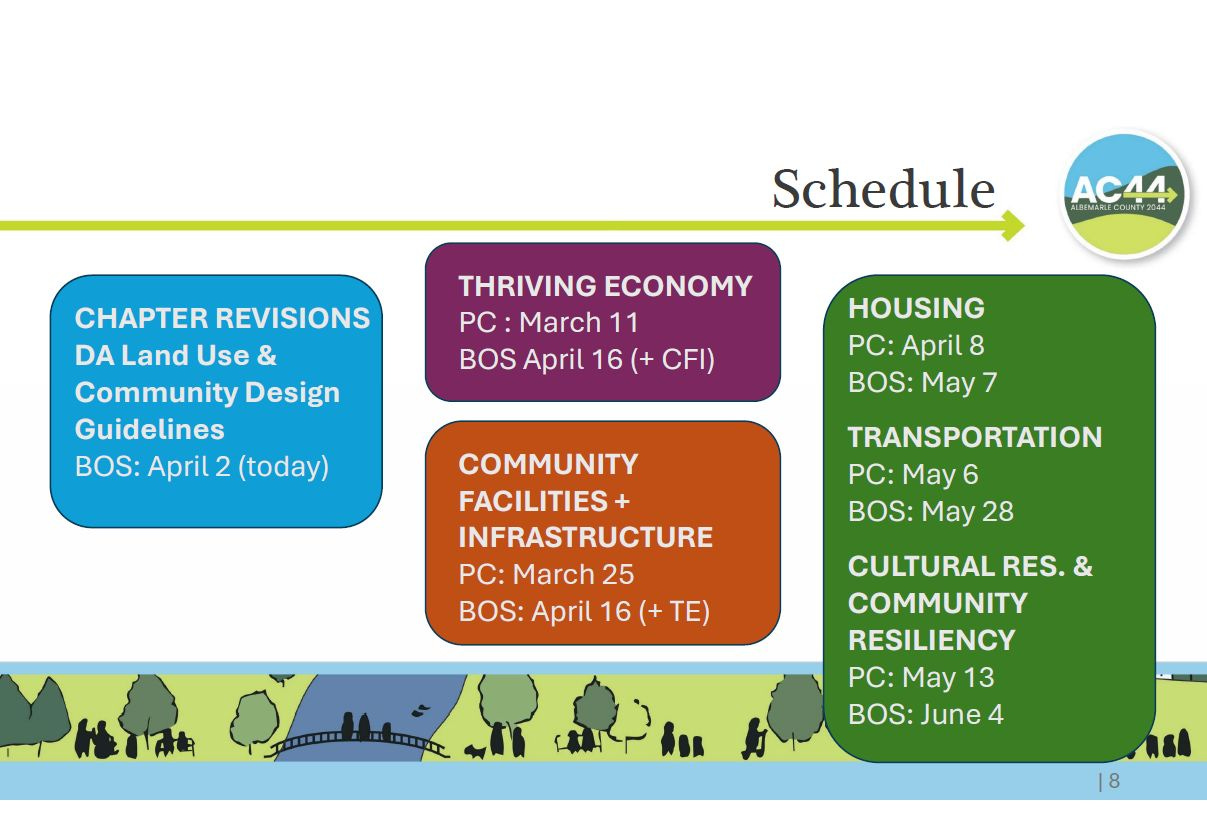
On April 2, Supervisors returned to a previous chapter. According to an outline, the six elected officials had spent two meetings on the Development Areas Land Use chapter and reviewed the goals on November 6, 2024 and actions on November 10. Staff made revisions and had just one question.
“Do the revisions and additions to the document meet your expectations for both of those pieces of the document?” said Tonya Swartzendruber, a planning manager with Albemarle County.
A full list of those revisions is available here and is written in the sort of jargon that makes assignment editors resistant to cover planning. Here is an attempt to summarize some of the changes for what is likely the least-read section of today’s newsletter:
The Future Land Use Map for the rural area now distinguishes between parkland and private open space with two different shades of green.
Suggested building heights for the Urban Residential land use category are now between two and five stories.
There is a new description for the Neighborhood Mixed Use category.
“Employment centers” are now called “employment districts.”
There is a new action to “allow residential uses in commercial districts to support more office to housing conversion and encourage more residential development” in the districts.
There is also a new action to allow reduced parking requirements if an applicant agrees to build or pay for multimodal transportation infrastructure.
Supervisors spent two hours on the topic on April 2. Supervisor Michael Pruitt of the Scottsville District expressed concern that the county’s community advisory committees would continue to play a strong role in determining the make-up of the Future Land Use Map.
In simple terms, the Future Land Use Map is a section of the Comprehensive Plan that generally categorizes land into what could be built there. This is separate from zoning which lists specific rules rather than aspirations.
“The land use map is one of the most important legislative decisions that we make as a board on land use,” Pruitt said. “And something I've expressed continued kind of frustration is that it feels like our own comprehensive plan is out of step with what we're saying, with what the zoning code says. It seems like this is a way to replicate that process moving forward.”
Jodie Filardo said the Community Advisory Committees will not be used to evaluate the county’s zoning code which has also been under review for several years.
“With the zoning ordinance, we are going to be bringing all of the zoning ordinance section by section to both the Planning Commission and the Board in public hearing and depending on how this thing rolls out, likely in work sessions prior to public hearing,” Filardo said.
Filardo said staff is hopeful the Future Land Use Map adopted as part of the AC44 basis will form the basis of zoning changes to make the two documents more in synch with each other.
Pruitt pointed out the master plans for areas covered by the Community Advisory Committees have not themselves been updated in years. The one for southern and western neighborhoods, for instance, hasn’t been reviewed or updated since 2015.
“I'm worried that there has not been public feedback and discussion on this issue specifically,” Pruitt said.
Pruitt said he watched the process unfold in Charlottesville where there was a concerted effort from groups like the Legal Aid Justice Center to change land use policy. He asked both staff and his colleagues if there was another way forward.
Filardo said there was a timing issue and staff has identified October 15 as the date when the plan will be adopted.
Rural residential?
A good portion of the discussion on April 2 dealt with how much residential development should occur in the roughly 95 percent of Albemarle’s landmass that is designated as rural.
Each chapter of the comprehensive plan has a goal and the one in the draft Development Area Land Use reads as follows.
“Albemarle County’s Development Areas will be thriving, walkable, and mixed use, with a variety of housing types that are connected by multimodal transportation options to goods, services, employment opportunities, and parks and natural areas,” reads the first sentence. “Neighborhoods will be green and resilient with tree coverage, protected natural features, and energy-efficient designs. Land use planning in the Development Areas will consider the housing and business needs of current and future community members and will encourage efficient use of land through redevelopment, infill, and adaptive reuse.”
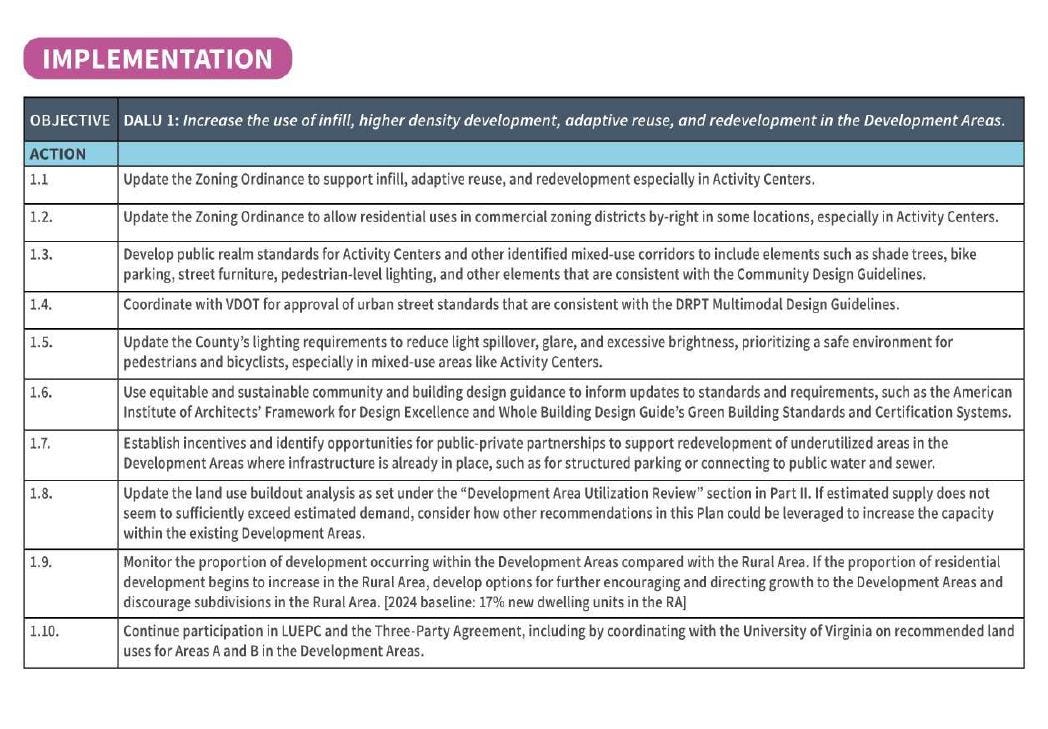
Each chapter has many objectives, each of which has several potential actions. Objective 1 of this chapter is to “increase the use of infill, higher density development, adaptive reuse, and redevelopment in the Development Areas.”
Action 1.9 reads: “Monitor the proportion of development occurring within the Development Areas compared with the Rural Area (RA). If the proportion of residential development begins to increase in the Rural Area, develop options for further encouraging and directing growth to the Development Areas and discourage subdivisions in the Rural Area. [2024 baseline: 17 percent new dwelling units in the RA.]
Supervisor Ned Gallaway wanted to know if staff could calculate the maximum number of residential units that could be built in the rural area. One staff member, Tori Kanellopoulos, said estimates are difficult given a limited number of development rights. Gallaway suggested that the action in 1.9 doesn’t yield useful information.
“If the proportion of residential development begins to increase in the rural area and it's all done by-right based on rural areas owning,” Gallaway said. “I don't understand the logic behind what we're doing here.”
On March 5, Gallaway was one of three votes in favor of a rezoning in the rural area that would allowed 50 mobile units on a portion of a 50 acre parcel. A tie vote in Albemarle ends in failure.
Filardo said the idea behind 1.9 is to provide some sort of a litmus test on what’s happening in the rural area.
“It was really intended as a much more blunt instrument than I think you are anticipating,” Filardo said. “I don't know if that helps, but that was really the intention of this.”
Other Supervisors supported the goal as a piece of information. Supervisor Mike Pruitt said the relatively low number of new homes built in the rural area are seen as a policy failure by some in the community.
“My equity-focused citizens who primarily live in the urban area, who are often involved in public advocacy, are very concerned about the density that we are accomplishing in our development area and whether or not we can continue to accomplish the density and frankly just the deployment of housing units that we need in the existing development area,” Pruitt said. “There are people who are concerned that the development area is not big enough and that infill is going to be more challenging.”
Pruitt also acknowledged there are those who believe the rural area should be preserved, but also added that many of his constituents who live outside development areas do so because it is affordable to them. He said continuing to make a comparative number should help the overall conversation.
“I think it's important to have a warning light when our policies are not working as intended,” Pruitt said.
Pruitt voted for the mobile home rezoning, as did Supervisor Diantha McKeel who said people with working class incomes are losing the ability to live in the community.
“The property is not as expensive in the rural area,” McKeel said. “The manufactured home proposal offered a great opportunity, but we couldn't approve it. We couldn't as a Board approve it because it was not in the [Comprehensive Plan]. I'm not sure how we solve that problem. We have become an Aspen.”
This is only a partial account of this section of the AC44 process, but at least you’re getting it within 36 hours of when the talking stopped. Questions? Comments? I can provide links to additional information to help facilitate the conversation.
Next time: More from the Albemarle County Supervisor meeting from April 2, 2025. We’re not even a third of the way through yet!
Reading material for #842
School construction sales tax proposal vetoed by governor, Brian Carlton, Kenbridge Victoria Dispatch, April 1, 2025
Dominion Energy proposes hefty rate hikes, Josh Janney, Virginia Business (paywall), April 1, 2025
Political theater takes center stage as legislature returns for veto session, Markus Schmidt, Virginia Mercury, April 2, 2025
Duffy Delivers Mixed Messages on ‘Woke’ Transportation Funding Delays, Kea Wilson, Streetsblog, April 2, 2025
CHO resumes operations after mechanical issue, Pimm Dyar, CBS19 News, April 2, 2025
#842 begins the evaporation process
Today’s edition follows a simple formula – cover a meeting and get as much out of it as possible. When I was at Charlottesville Tomorrow, I always thought we should be doing something like this. After all, I was hired to help think outside how the local government was reported. I did that for eleven years and my style was ultimately rejected. I’ve told this story elsewhere.
Today I want to say how thrilled I am that I get to keep experimenting. I became a journalist because I am interested in the world and how it works. More than three decades later, I still have more questions than answers but every single edition of this newsletter is hopefully fueled by my enthusiasm for a profession that has been hollowed out over the years.
Does today’s edition work as a newsletter? Think of the newsletter as a script for a radio program. I would have recorded the narration for this now and released this as a podcast as well like in the past, but my workplace is currently adjacent to two separate construction projects. I have to wait for them to stop for the day.
My day will continue on. In the recent past I’d stop for a while as soon as the newsletter was concluded. Today I want to get the next Fifth District Community Engagement out as well as make sure some of these stories are on Information Charlottesville.
It’s a full life. That there are new subscribers each day will keep me going. That I believe in the power in this profession will keep me going. That I can put ingredients in a slow cooker at 6:15 a.m. and have a meal at 3 p.m. will keep me going.
Also, Taskmaster. Taskmaster will keep me going. Here’s a good intro segment;

